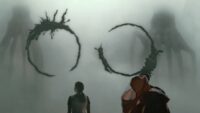Dawn Kiefer is the editor of a weekly Southwest Wisconsin newspaper. She is a lifelong film enthusiast, particularly of psychological horror and the macabre, as well as an avid collector of vintage fashion dolls and paper dolls. Her university studies had an emphasis in journalism and art history. This is the second in a three-part series of essays on Ari Aster’s Midsommar.
Being very interested in film analysis, I often wonder whether the characters’ names have a deeper symbolic meaning.
Knowing that director Ari Aster methodically writes and directs his productions has me convinced that character names are not chosen at random.
I did some research into the meanings of prominent characters’ names in Aster’s film “Midsommar.”
I’ll start with the boyfriend of the film’s female protagonist: Christian Hughes. This character name seems to be the most straightforward of all. His name, Christian, might be emblematic of the perpetual clash between pagans and Christians. Additionally, his name makes me think of the slang term “crisscross,” which means “the state of being at cross-purposes; a confused state.” (1)
Christian can be perceived as having been at cross-purposes with the Hargas in general and with Pelle in particular. I believe that Christian had been set up to be both a sacrificial victim and a “sperm donor” for a Hargas maiden, from the time that he met Pelle in the US, if not even earlier than that. I have a hypothesis about what I suspect was an elaborate plot regarding the film’s main non-Hargas characters, but that is laid out in a separate essay. If my hypothesis is correct, Christian had been lured to Halsingland to mate with virginal Hargas young woman Maja and to be sacrificed during the cult’s 90th-anniversary festival. I posit that Christian was at cross-purposes with Pelle in particular because I believe that Pelle is in love with Dani and was actively “stealing her” from Christian throughout situations presented during the film; even back in the US.
I also looked up Christian’s last name, Hughes; a variation of the name Hugh, which comes from the Germanic element hug, meaning “heart, mind, spirit.” (2) Ultimately, one might get the impression that Christian was enveloped in the ultimate “bear hug” when his body is placed into a disemboweled bear carcass preparatory to being burned alive in the sacrificial structure.
The name Dani is the feminine form of Daniel, which means “God is my judge.” (3) I think of the Biblical Daniel surviving the lions’ den. Many of the film’s viewers might judge Dani for choosing Christian as the final sacrificial victim, but I aver that Christian was meant to be sacrificed all along. In any case, I don’t see how the cult could have spared his life even if she had chosen the Hargas man to be sacrificed instead. Christian knew about the deaths of his comrades and the British couple.
Dani’s last name is Ardor, an uncommon surname of British origin. (4) Synonyms for ardor include emotion, fervor, heat, intensity, passion. In my viewpoint, Dani’s character has the capacity for passionate fervor, but her withering relationship with Christian has stifled that. (5) Incidentally, I wonder if the A-shaped building used for the fiery sacrifices was meant to symbolize the burning away (catharsis) of Dani’s original familial and love connections. Gone are both her family and her longtime boyfriend. She’s now free to move forward with her new “family” and with what I believe will be a loving relationship with Pelle. As for the building, with the small window at its front, it does resemble the capital letter A.

I find it interesting that the names of the other two American students and the British male all have Biblical origins: Josh(ua), Mark and Simon.
The name Joshua means “Jehovah is generous.” (6) However, in slang terms, josh means to “ridicule or tease someone.” (7) It’s clear that Josh was earnest about his study of the Hargas culture, but, in reality, the joke was on him, as he was all along headed for the sacrificial pyre.
One possible meaning for the name Mark is related to Mars, or “war-like.” (8) But, in slang terms, a mark is “a target that is very vulnerable to attack from others; like a sitting duck.” (9) It seems to me that both of these meanings could fit his character. Mark is “war-like” in that he’s constantly acting in a way that spurs conflict or irritation. When we see what fate befalls him, it’s easy to see, in retrospect, that he was like a sitting duck. Even in the mural that’s shown at the opening of the film, Mark is twice depicted as wearing a fool’s hat.
Simon means “he has heard.” (10) I sense that Simon may have heard, but didn’t want to listen. Hargas matriarch Siv attempted to explain their ritual suicide beliefs to him, but he clearly wasn’t having any of it. He loudly insulted all the Hargas and I believe that is why he was made to endure the ancient Viking torture called “the blood eagle.”
His name also makes me think of the nursery rhyme “Simple Simon.” Its closing verses seem creepy in relation to Simon’s fate in the film. “Simple Simon went to look if plums grew on a thistle; he pricked his fingers very much, which made poor Simon whistle. He went for water in a sieve, but soon it all fell through; and now poor Simple Simon bids you all adieu.”
Simon’s fiancée is named Connie, which means “steadfast.” (11) We film viewers didn’t get to know Connie (or Simon) well, but she did seem devoted to Simon and that could account for steadfastness. And the following may be a stretch, but here goes. The word con means “trick or dupe.” (12) Thus, as in words like addressee and adoptee, she could be thought of as a con-ee. She, Simon, Josh, Mark and Christian all were certainly conned and duped.
Pelle is the Swedish form of Peter, which means “rock or stone.” (13) Pelle is Dani’s “rock”? Throughout the film Pelle is emotionally supportive of Dani. This can be seen even during scenes when the main characters are all still in the US. I recommend that anyone watch this film more than once. On a subsequent viewing focus on Pelle whenever he’s in a scene and I think you’ll agree that he consistently is attentive to Dani and focused on what she is doing or her reactions. In a separate essay I laid out my hypothesis that Pelle is in love with Dani. The second of five panels that make up the mural at the film’s opening depicts what I surmise to be the love triangle between Christian, Dani and Pelle.
Coincidentally, there are interesting meanings in relation to the film for the first name and surname of the actor who portrays Pelle: Vilhelm Blomgren. Vilhelm means “determined protector” (14) and Blomgren means “flower branch” (15). To me, Pelle’s character is a determined protector of Dani and the “flower branch” is easily relatable to the overall floral motif of the film. Again, these are obviously coincidences. I’m sure the actor was chosen for his excellent acting abilities and good looks.
Ulf means “wolf.” (16) In a separate essay, I put forth the notion that Ulf flew to the US and killed Dani’s family, which could fit the notion of a “wolf.” I base my hypothesis on the scene before Ulf and Ingemar give themselves up as live sacrifices, to be burned alive. An elder says to Ingemar and Ulf, “You brought outside offerings, thus volunteering your own bodies.” Ingemar had lured Simon and Connie from London to be sacrificial victims and Pelle had lured the other three (Josh, Mark and Christian), who made up the entire five outside offerings needed. So, how did Ulf figure into this equation? I assert that he was provided with the address of the Ardor family, flew to the US and staged what was meant to appear as a murder-suicide. The Ardor family’s deaths helped spur Dani to come along on the trip to Sweden and may have cemented Christian’s resolve to go. The co-dependent nature of Christian’s and Dani’s relationship could make it easy to believe that he might have bailed out on going if she had decided not to go.
Ingemar means “of the sea.” (17) Perhaps “of the sea” connects with the Viking roots of the Hargas people. Interviews of director Ari Aster and articles written about “Midsommar” indicate that he based the film’s mythology on an array of actual and mythical customs of the ancient Vikings and other European ethnological groups.
(1) Merriam-Webster
(2) Behindthename.com
(3) Behindthename.com
(4) Ancestry.com
(5) Merriam-Webster
(6) Sheknows.com
(7) Green’s Dictionary of Slang
(8) Baby Name Wizard
(9) Urban Dictionary
(10) Behindthename.com
(11) Sheknows.com
(12) Mentalfloss.com
(13) Baby Name Wizard
(14) Sheknows.com
(15) Ancestry.com
(16) Behindthename.com
(17) Sheknows.com




Hey Dawn. There is an old danish religious text called Towards the light. In this text, the devils original name is Ardor. Thats the first I thought of, when I watched the movie. If it fits with whats going on, I dont know, but its certainly a biblical reference, if the director knows about this text.
Best regards Jesper
Yeah yeah yeah PLUS someone on reddit pointed out that when we see inside Dani’s parents’ home there is a big flowery wreath visible. (I haven’t gone back to confirm.)
Also, when Ingemar introduces Connie and Simon, he reveals that he had “been dating” Connie first; Connie gently corrects him; she thot they were just hanging out, not on a date. Seems to me Ingemar (is that his name?) is passed about this and relished the idea of disemboweling his romantic rival.
I’ll say this tho: if Dani had chosen Christian, it would have been with the expectation that he would buy into the cult as she apparently does. IMO she condemns him to death because she knows he won’t. She also knows about all these deaths, and nobody’s worried about her. So it’s conceivable that she could redeem him if he were willing. (But he ain’t.)
I totally agree with that about Christian. She knew for sure he wouldn’t fit in with the Harga, and that he just wasn’t the right guy for her. And yes, there is a flowery wreath next to a picture of Dani on their bedside tables as they die. Very foreboding! That along with the picture of the bear and the little blonde girl, do hint that this was always Dani’s destiny, to be a May Queen.